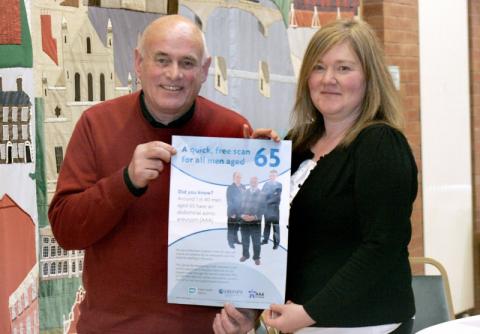Herbert McMullan from Downpatrick knows that AAA screening can save lives!

The Public Health Agency (PHA) is urging all men aged 65 and over to seriously consider taking up the offer of having Abdominal Aortic Aneurysm (AAA) screening.
The aorta is the main artery that supplies blood to your body. It runs from your heart down through your chest and abdomen (belly). As some people get older, the wall of the aorta in the abdomen can become weak and balloon out to form an aneurysm, rather like a bulge in a worn tyre. This is called an abdominal aortic aneurysm (AAA).
The AAA screening programme was introduced across Northern Ireland in the summer of 2012 to reduce AAA-related deaths.
Herbert McMullan from Downpatrick knows all too well how vital this health check is.
Herbert is retired and he had no worries about his health when he received the letter from the Northern Ireland AAA screening programme inviting him to go along for screening.
Herbert explains: “Last May I received the letter to attend the screening at the Downe Hospital. I felt well and had no reason to worry, and I didn’t even know what an aortic aneurysm was or that I could possibly have one, but I thought ‘why not?’ – any health check has to be a positive step to looking after my health.”
Herbert was shown into the scanning room where the procedure was explained to him. The test was simple and pain-free. Some gel was applied to his skin and the ultrasound scanner was moved across his abdomen.
The scan detected that Herbert had a small sized aortic aneurysm. As most AAAs grow very slowly, men with a small or medium AAA may never develop a large AAA but will be monitored accordingly to see if it grows.
Herbert continued: “The scan only took 15 minutes and immediately afterwards I was told by the technician that I had a small sized aortic aneurysm. She gave me an information leaflet and said at this stage I only needed to be monitored. They also notified my GP with the results of the scan. I was reassured that at least now I know about the aneurysm and that it will be monitored to help prevent it becoming fatal.
“I was scanned again a few weeks ago and 12 months on nothing has changed, so I have peace of mind. I had never heard of AAA screening before this, but I would strongly advise any men who are invited to have a scan to go for it.”
Each year around 80 to100 people in Northern Ireland die from a ruptured abdominal aortic aneurysm (AAA). Most people with the condition will be unaware that they have an aneurysm as they rarely have symptoms, but it is often life-threatening if it ruptures.
Research shows that men are six times more likely to have this type of aneurysm than women and the chance of having one increases with age. The good news is that if an aneurysm is detected early it can be monitored and, if necessary, treated. Screening men aged 65 using an ultrasound scan reduces the death rate from ruptured AAAs by around 50%.
Dr Adrian Mairs, Consultant in Public Health Medicine at the PHA and public health lead for the Northern Ireland AAA Screening Programme, said: “Approximately one in every 40 men aged 65 will have an abdominal aortic aneurysm and usually don’t know they have it. However, AAAs are easy to detect by screening, which reduces deaths from the disease. With this in mind we introduced the Northern Ireland AAA Screening Programme in June 2012.
“Men are invited to attend in the year they turn 65. Older men can phone the screening office and request a screening appointment. The phone number is 028 9063 1828. The programme now provides screening at 19 different locations.”
“It is extremely encouraging to see that, since the introduction of the screening programme, over 80per cent of men invited have attended – almost 16,500 in total – with 260 AAAs detected in less than two years.”
The risk of having an abdominal aortic aneurysm is increased if:
• You smoke
• You have high blood pressure
• Your brother, sister or parent has, or had, an AAA.
“I encourage all men who receive an appointment for AAA screening to seriously consider taking up the offer of this quick and painless health check,” Dr Mairs concluded.
Those eligible for screening will receive an invitation leaflet in the post at the home address provided by their GP. It is therefore important that your GP has your most up-to-date address and correct date of birth or you may miss the chance to take part in the programme.
